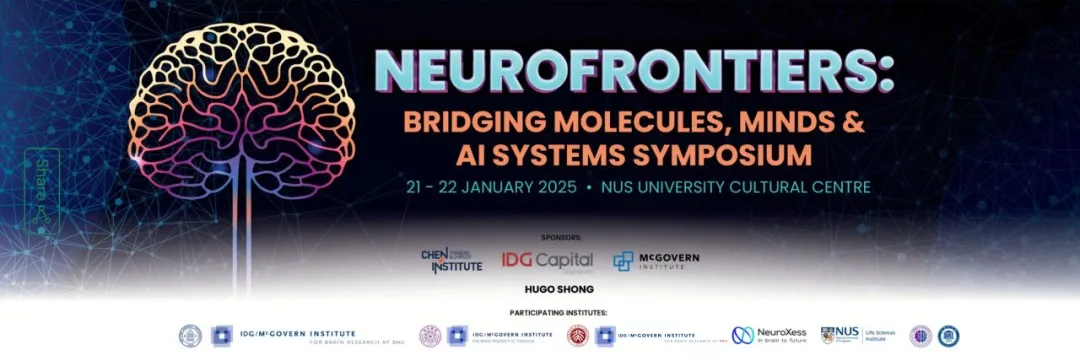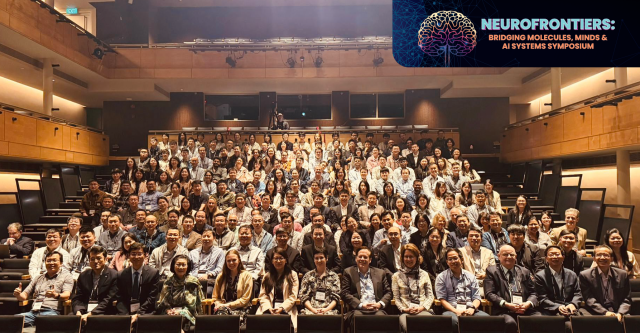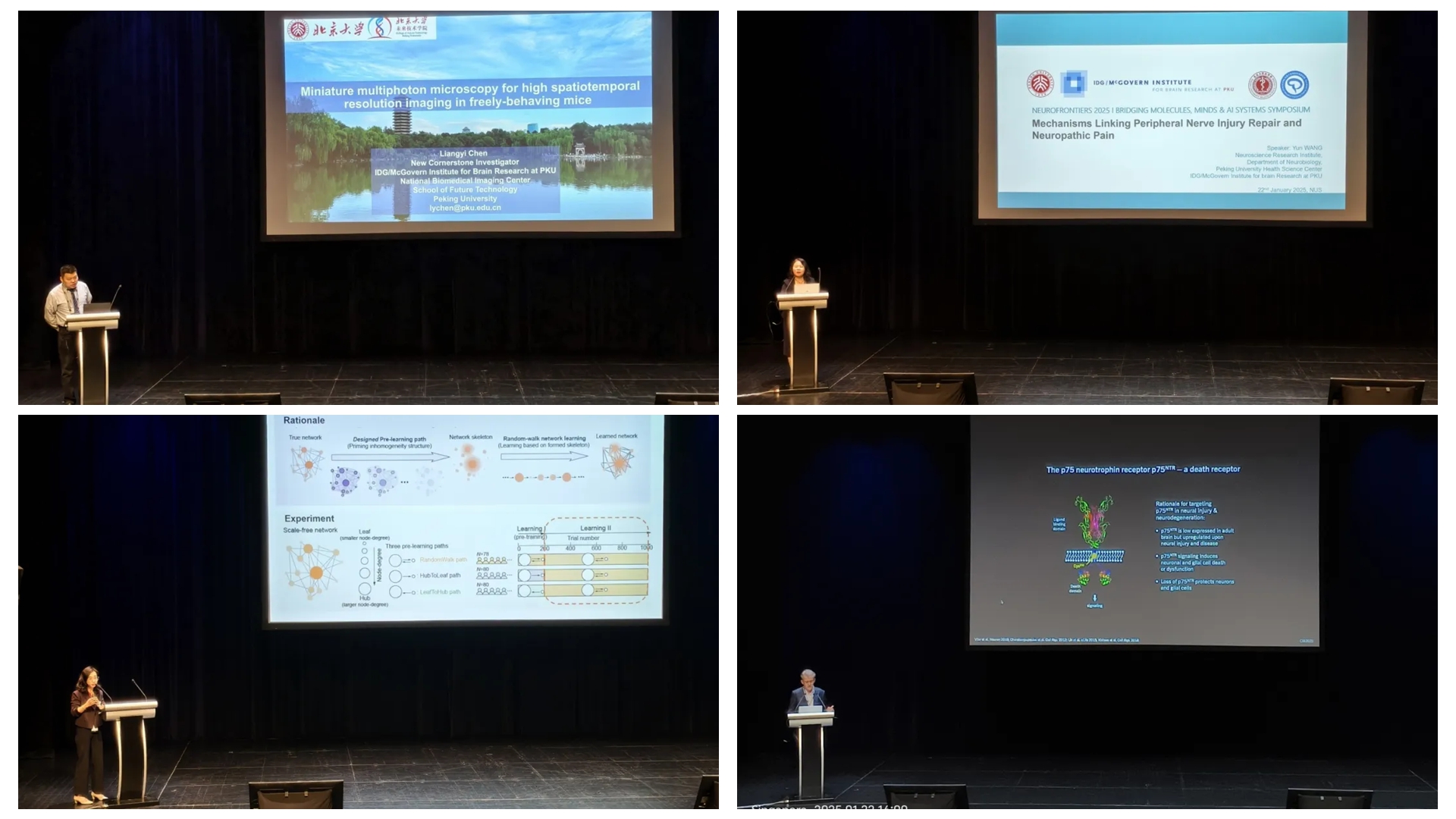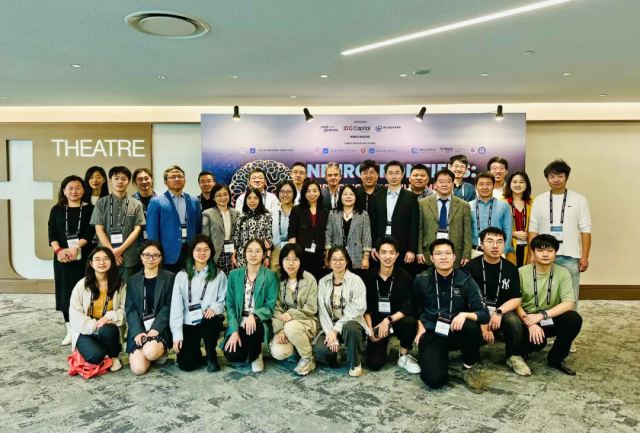Building bridges and fostering global collaboration in neuroscience and AI research
The inaugural NeuroFrontiers Symposium gathered leading neuroscience researchers from the USA, China and Singapore to engage in discussions and was a platform for forging partnerships and advancing research collaborations in neuroscience and artificial intelligence.
Neuroscience is a fast-evolving discipline that closely intersects with other fields - including immunology, metabolism, cancer, and more recently, artificial intelligence (AI) – driving new discoveries and innovations. These intersections reflect the importance of global collaboration in neuroscience, as researchers integrate emerging technologies like AI and computational models into their research.
Amidst this backdrop, the NeuroFrontiers Symposium, held from 21 to 22 January 2025 at the NUS University Cultural Centre, brought together top neuroscience researchers, stakeholders, and students from the USA, China and Singapore, providing a dynamic platform for advancing global collaboration in brain research, particularly through the adoption of cutting-edge technologies. The inaugural symposium was organised by the NUS Life Sciences Institute’s Neurobiology Research Programme in collaboration with IDG Capital, the McGovern Institute for Brain Research at the Massachusetts Institute of Technology (MIT) and the McGovern Institute in Peking University, Tsinghua University, and Beijing Normal University. It was sponsored by The Tianqiao and Chrissy Chen Institute, IDG Capital (Singapore), and McGovern Institute.

Speeches were delivered at the opening ceremony by Professor Tan Eng Chye, President of the National University of Singapore (NUS); Ms. Lore McGovern; Mr. Hugo Shong, Global Chairman of IDG Capital; Professor Barry Halliwell from the NUS Life Sciences Institute; Professor Bob Desimone from the McGovern Institute for Brain Research at MIT; Professor Yulong Li from the IDG/McGovern Institute for Brain Research at Peking University; Professor Songhai Shi from the IDG/McGovern Institute for Brain Research at Tsinghua University; Professor Xiaoqun Wang from the IDG/McGovern Institute for Brain Research at Beijing Normal University .
Themed ‘Bridging Molecules, Minds, and AI systems’, the symposium underscored the critical role of cross-border partnerships in tackling grand challenges in neuroscience and AI. More than 240 participants attended the event, including leading experts in computational neuroscience, AI, and neural engineering. Key sessions of the symposium, such as keynote talks, panel discussions, and poster presentations, fostered collaboration and inspired new research initiatives.

Sessions at the symposium revolved around advancing global collaboration in neuroscience, particularly through emerging technologies like AI and computational models to drive brain research. Key themes included Biological and Artificial Intelligence, Neuroplasticity and Development, New Technologies, Brain-Body Health, and Nervous System Disorders and Treatments. A total of 19 scholars presented their latest research advancements. Researchers from the IDG/McGovern Institute for Brain Research at Peking University, including Prof. Huan Luo, Liangyi Chen, Yun Wang, and Carlos Ibanez, delivered their respective reports.Prof. Huan Luo explored neural mechanisms in her talk "Connecting the Dots: Relational Structure in Learning and Memory". Prof. Liangyi Chen showcased his team's breakthrough with "COMET: Cortex-wide Imaging at Single-Cell Resolution in Behaving Mice". Addressing pain mechanisms, Prof. Yun Wang presented findings on "Axonal Regeneration and Neuropathic Pain After Nerve Injury". Prof. Carlos Ibanez delivered an insightful analysis of "p75NTR in Alzheimer's: A Double-Edged Sword".

Participants also appreciated the chance to engage in insightful discussions with leading neuroscience and AI experts during the panel discussions, focusing on topics such as AI Implications in Neuroscience, Future Developments in Technology, and Health Care Impacts of Neuroscience. Professors Si Wu, Yulong Li, and Weihua Yue from the IDG/McGovern Institute for Brain Research at Peking University participated in these discussions.

The symposium also provided the opportunity for neuroscience researchers to present their work during the poster sessions, which generated enthusiastic discussions amongst participants.

The NeuroFrontiers Symposium successfully fostered meaningful dialogues and set the stage for deeper international partnerships in neuroscience and AI research. As AI technologies and brain science increasingly converge, global collaborations will be instrumental in driving the future of neuroscience innovation.
